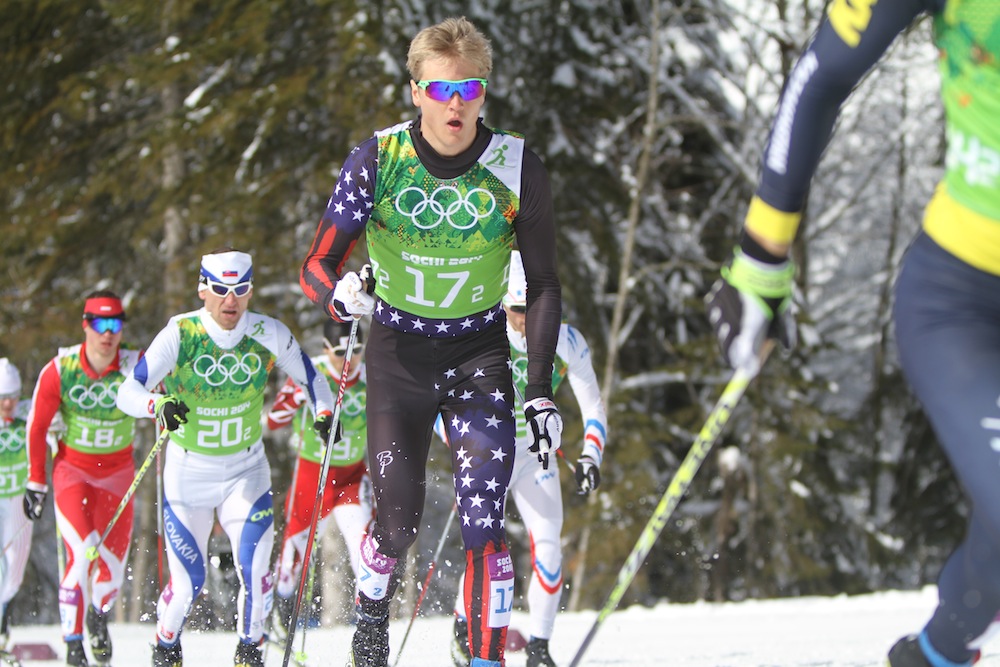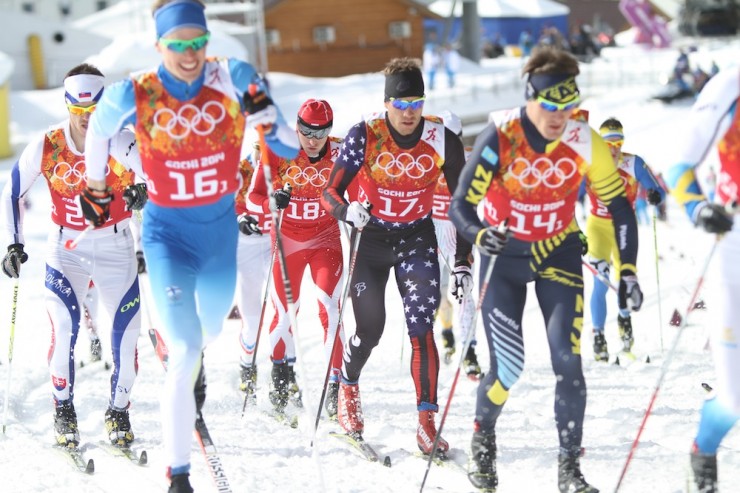
FasterSkier’s coverage is made possible through the generous support of Swix.
KRASNAYA POLYANA, Russia – Despite its strong start, the U.S. Ski Team has had a tough Olympic Games: medal hopes were dashed in event after event as things just didn’t work out, from athletes missing their peaks to broken poles, crashes, epic bonks, and an unfortunate wrong turn in the finishing lane of the women’s relay that seemed to sum everything up.
That’s why having the sunny personality and relentless optimism of Erik Bjornsen might come in handy. When the team’s perennial leader of the men’s sprint squad, Andy Newell, got sick, 22-year-old Bjornsen got the call for the team sprint, a format where two-person teams race around a sprint course, three loops per team member and tagging off in between.
Even though he’s a relative rookie, Bjornsen was unfazed. And having a positive attitude and a fresh approach to racing definitely opened doors.
“My goal coming into today was to make it into the finals,” Bjornsen said. “So that first heat [of the semifinals], I was just thinking the whole time, how am I going to make it into the top two? I got the chance in the last lap, and I just went for it.”
Go for it he did. On the final loop of the semifinal, Bjornsen was unintimidated by the likes of Russia’s Nikita Kriukov, who won gold in the individual sprint at the last Olympics; Sprint Cup champion Teodor Peterson of Sweden, who was silver in this Games’ individual sprint; and Sami Jauhojärvi of Finland, who went on to win gold in the final.
No, Bjornsen saw an opening on the course’s last huge climb and sent it, striding up at a scorching pace to take the lead over the pre-race favorites.
“I mean, that’s one of the best efforts I’ve had since I got here,” Bjornsen said.
But the spurt had a cost.
“I made it to the top and it really hit me. It was just trying to make it to the finish from the top of that hill. I think I got passed by four guys in that final stretch. When I made it to the finish line, I was like, whoa. Hopefully I made it and hopefully I’ll have another one of those efforts in the final.”
The U.S. ended up fifth in their semifinal, but with a fast enough time to advance to the finals. For Bjornsen, that was one goal completed.

For Hamilton, who teamed up with Newell to place seventh on the course here in Sochi at a World Cup last season, the concept of skiing the daunting 1.8 k loop three times in the semifinal and three times in the final was one of assured pain. After the individual sprint, where he finished 27th, he had wondered how he would ever make it around six times.
But with such a positive teammate – and such a fearless one – how could he dwell on that?
“He’s one of those guys who just, no matter what, he loves to race,” Hamilton said of Bjornsen, one of his roommates here at the Olympics. “He’s never complaining about anything, whether he comes in dead last or very first, he’s just psyched to be out there. I think that personality kind of rubs off on you. I’m psyched to be exposed to that.”
An hour or so later, they hit the starting line again. Right away, things were a bit different than in the semifinal.
“Speaking for both of us here, I think we both felt really good in our semifinal,” Hamilton said. “And the final was hard, to put it simply. It was hammer down from the start. We just tried to hang in there and had fun with it.”
For much of the race, the Americans were hovering in eighth place, on the back of the pack. They began to move up after a crash by Ales Razym of the Czech Republic, and then passed the Kazakhstan team.
“When Simi was coming down that hill I was counting guys, like, wow, he’s in seventh,” Bjornsen said of waiting on the line before his final loop. “I got really excited. And I was like, yes, he’s leaving me with a gap. I think I can hold this.”
He did, and better: after Germany’s Tim Tscharnke crashed from a collision with Jauhojärvi, he basically gave up. Bjornsen found him in the finishing lanes, and passed him.
“I saw at the finish this German guy was walking, and I was like, what is this guy doing, is he still racing?” Bjornsen asked. “I’m going for it! Sixth place, that’s awesome!”
Hamilton was still wowed by Bjornsen’s attitude: “He was that psyched just to wake up this morning,” Hamilton joked. “That’s what it’s been like rooming with him for the last two weeks. ‘What, there’s free potatoes at the cafeteria? This is so awesome! Free coke?’”
“It’s been a fun Olympics,” Bjornsen agreed.
Sixth place represented the best team sprint finish by a U.S. men’s team in the three Olympics where the event was held. In Vancouver four years ago, Newell and Torin Koos placed ninth. In Torino in the event’s Olympic debut, Newell and Chris Cook placed 13th.
Today the American pair wasn’t close to a medal, finishing 35 seconds behind first-place Finland and 20 behind bronze medalist Sweden. But this wasn’t a usual sprint relay, either: the course’s huge hills strung out and separated the field more than usual.
Hamilton is a veteran who picked up his first World Cup win this season, and it showed. His skiing was consistent from loop to loop, with the sixth-, fifth-, and seventh-fastest times in the final.
Bjornsen started strong with the fifth-fastest leg, but tired more quickly.
“Hopefully with more training and more experience I’ll be able to make it to the finals and have an effort left to be able to make a few surges in the finals,” Bjornsen said. “I didn’t feel that today, but I was super happy with sixth place.”
It was only Bjornsen’s fourth team sprint at the international level. He had World Cup finishes of 27th and 25th in the event, and a 14th-place showing with Newell at last year’s World Championships. That effort, where the team did not make the final, was in the front of his mind today.
“Last year I skied at World Championships when Simi got sick and I took his spot, and we didn’t make the finals,” Bjornsen said. “It’s always so hard to get knocked out in the first round.”
And while he said he didn’t see any of the crashes in the final happen, he was definitely thinking about staying on his feet since part of that 14th-place result came via a crash. He didn’t want to repeat that.
Overall, everyone seemed impressed by the result from Hamilton and Bjornsen, a slightly different team than the U.S. had anticipated starting, but one that got the job done. Bjornsen is considered an all-around skier, unlike Hamilton and Newell, and that might have helped on the tough Sochi course.
“With a course that’s running whatever it is, 3:53, with a hill like that that’s taking the best skiers and reducing their legs to jelly, you need somebody with a lot of aerobic strength,” U.S. Head Coach Chris Grover said. “We’re not quite at the place in classic sprint where on a course that’s that hard, that we can quite keep up with it.”
But both Hamilton, who said that his Olympics so far had been “definitely a little frustrating,” and Bjornsen took today as a motivation to improve.
“I think we’re both encouraged for the future, and training hard so we can be top three in this event someday in the Olympics,” Hamilton said.
Both he and Grover look forward to having Bjornsen in the mix more often, although Hamilton laughed that he didn’t want Bjornsen stealing his starts any time soon.
“Nobody’s having as much fun as he is,” Hamilton said. “I’m usually pretty average. It rubs off on me. It has been awesome just having him with us this year. He has really proved himself to be here. He skied awesome. He’s going to be joining us for the last couple of World Cups this year, so we’re psyched. He’s a great addition to this team and just brings a really positive attitude to it.”
Bjornsen returned the compliment.
“I have super nice teammates and they’re really great role models,” he said.
“We’re going to start making out here soon,” Hamilto joked before being hurried off by the team’s press attaché.
—Alex Matthews and Nat Herz contributed reporting.
Chelsea Little
Chelsea Little is FasterSkier's Editor-At-Large. A former racer at Ford Sayre, Dartmouth College and the Craftsbury Green Racing Project, she is a PhD candidate in aquatic ecology in the @Altermatt_lab at Eawag, the Swiss Federal Institute of Aquatic Science and Technology in Zurich, Switzerland. You can follow her on twitter @ChelskiLittle.




2 comments
joeconn4
February 19, 2014 at 3:19 pm
It was great to see nobody on skate skis and DPing the entire course. A+ on your sprint course design Sochi!
teamepokeedsbyn
February 20, 2014 at 4:18 pm
Man, the men’s course looked tough, given the speeds and number of times each team had to ski it. Impressive the US guys made it to the finals. Well done.